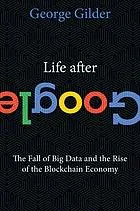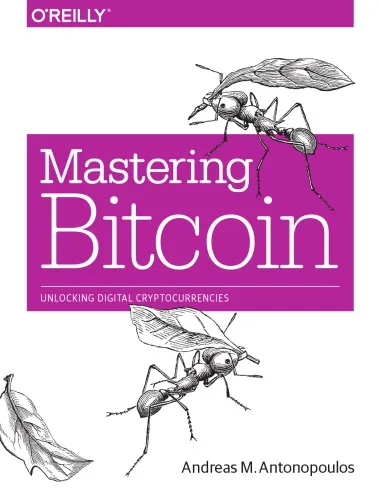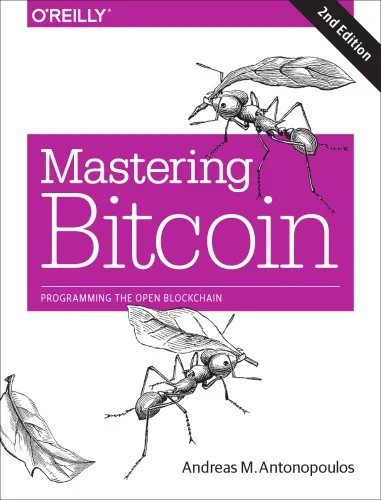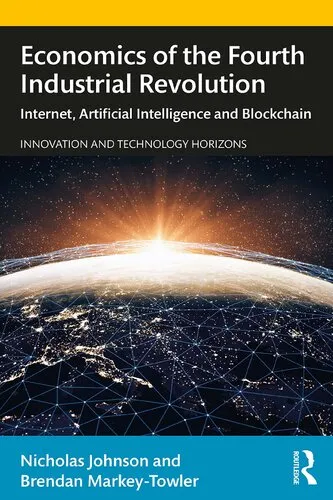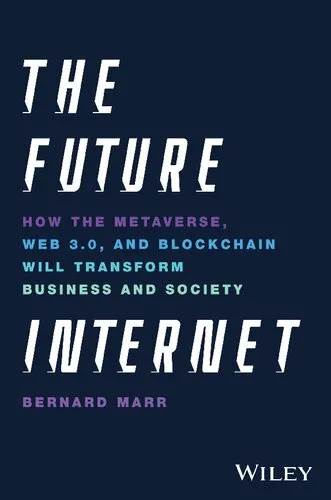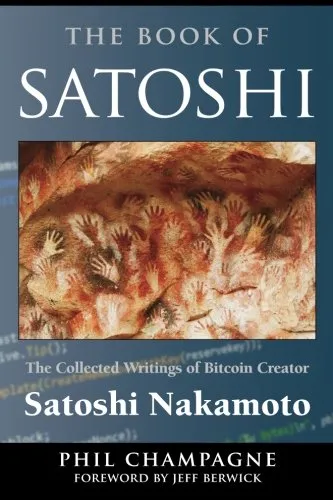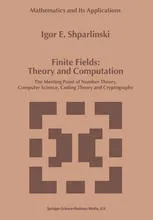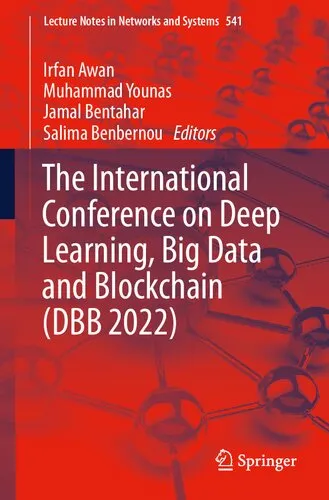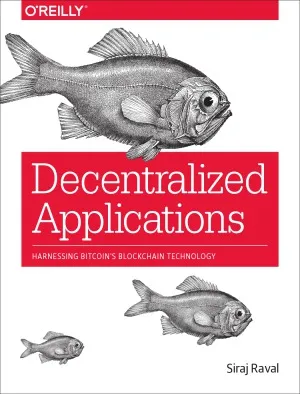Life after Google : the fall of big data and the rise of the blockchain economy
4.0
بر اساس نظر کاربران

شما میتونید سوالاتتون در باره کتاب رو از هوش مصنوعیش بعد از ورود بپرسید
هر دانلود یا پرسش از هوش مصنوعی 2 امتیاز لازم دارد، برای بدست آوردن امتیاز رایگان، به صفحه ی راهنمای امتیازات سر بزنید و یک سری کار ارزشمند انجام بدینکتاب های مرتبط:
مروری بر کتاب "Life after Google: The Fall of Big Data and the Rise of the Blockchain Economy"
کتاب "Life after Google: The Fall of Big Data and the Rise of the Blockchain Economy" نوشته جورج فیلد گیلدر، اثری قابل توجه است که به بررسی عصر پس از فناوریهای متمرکز Google پرداخته و ظهور اقتصاد مبتنی بر Blockchain را برجسته میکند. این کتاب، خوانندگان را به سفری در آیندهای جذاب میبرد که در آن دادهها و امنیت کاربران به طور بنیادین تحولی مییابند.
خلاصه دقیق از کتاب
در این کتاب، گیلدر طرح کلی جهان پس از سلطه Big Data و سلطه شرکتهای بزرگ فناوری مانند Google را ارائه میدهد. این اثر به شکست مدلهای امنیتی فعلی مبتنی بر رمزهای عبور اشاره کرده و بیان میکند که سیستمهای متمرکز دیگر قادر به مقابله با حملات سایبری نخواهند بود.
گیلدر بیان میکند که Google و دیگر غولهای فناوری، دیدگاهی غلط از اینترنت دارند که آن را به یک مدل رایگان اما متمرکز تقلیل داده است. او بر این باور است که این سیستم، نه تنها محدودیتهایی برای نوآوری ایجاد کرده است، بلکه امنیت و حریم خصوصی کاربران را نیز به خطر انداخته است. وی به جای این مدل، بر فناوری Blockchain تمرکز میکند؛ سیستمی غیرمتمرکز که از رمزنگاری پیشرفته بهره میبرد و ارائهدهنده امنیت و شفافیت بیشتر است.
با بررسی مشکلات اساسی فناوریهای فعلی، گیلدر نشان میدهد که Blockchain چگونه میتواند مدلهای اقتصادی شفافتر، اخلاقیتر و غیروابسته به واسطهها را ایجاد کند. او ادعا میکند که این فناوری به جای وابستگی به شرکتهای بزرگ، قدرت را به دست کاربران منتقل خواهد کرد.
نکات کلیدی از کتاب
- Google به دلیل مدل درآمدی رایگان و متکی به آگهیها، ناپایداری مالی ایجاد کرده است.
- تکنولوژی Blockchain ابزار اصلی برای حل مشکلات امنیت سایبری و غیرمتمرکزسازی است.
- اقتصاد دیجیتال آینده به حریم خصوصی و کنترل کاربر متکی خواهد بود، نه شرکتهایی که دادهها را انحصاری میکنند.
- کاربران باید از ابزارهای غیروابسته به واسطهها برای دسترسی به خدمات دیجیتال استفاده کنند.
نقل قولهای مشهور از کتاب
"The problem with Google’s empire is not just that it's bad for privacy or innovation — it’s that its foundational ideology of AI-driven control is doomed to fail."
"Blockchain is not just a technology, it's the greatest technological uprising since the internet itself."
"Big Data is dead. The future belongs to those who can secure individual data ownership."
چرا این کتاب اهمیت دارد؟
کتاب Life after Google دیدگاههای چالشبرانگیزی درباره آینده فناوری و اینترنت ارائه میدهد. در عصری که امنیت سایبری به صورت فزایندهای تهدید میشود، جورج گیلدر راهکاری آیندهنگرانه در قالب Blockchain معرفی میکند. این کتاب برای صاحبان کسبوکار، نوآوران فناوری، و علاقهمندان به اقتصاد دیجیتال کاربردی و حیاتی است. علاوه بر این، کتاب به خوانندگان نشان میدهد که چگونه میتوانند در عصر آینده دیجیتال، امنیت اطلاعات و حریم خصوصی خود را حفظ کنند.
گیلدر با ترکیب فناوری، فلسفه، و اقتصاد، اثری ارائه میدهد که تاثیر عمیقی بر خواننده باقی خواهد گذاشت و او را به بازنگری در دیدگاه خود درباره فناوریهای حاکم وا میدارد. اهمیت این کتاب در این است که راهنمایی الهامبخش برای حرکت به سوی اقتصاد دیجیتالی جدید است که در آن آزادی، مالکیت داده و غیرمتمرکزسازی در اولویت قرار میگیرد.
Welcome to Life After Google: The Fall of Big Data and the Rise of the Blockchain Economy, a visionary work by bestselling author George F. Gilder. This groundbreaking book challenges the very foundations of our digital economy, examining the dominance of big data and centralized technology platforms. By introducing readers to the revolutionary potential of blockchain technology, Gilder paints a compelling picture of a future where centralized control dissolves into a decentralized and more secure digital ecosystem. Lavishly researched and insightfully narrated, this book offers a bold and enlightening perspective on the technological, economic, and philosophical revolutions shaping our modern world.
Detailed Summary of the Book
In Life After Google, George Gilder critiques what he calls the “Google model,” a system where centralized, free, and advertising-funded platforms dominate the internet. He argues that such a model is deeply flawed because it prioritizes surveillance, captures user data, and is unsustainable in the long run. Gilder pinpoints Google’s key assumptions—free services, centralized control of data, and reliance on artificial intelligence (AI)—as the root causes of this unsustainability. He asserts that these principles inevitably lead to inefficiencies, vulnerabilities, and breaches of trust.
At the heart of this critique lies his celebration of blockchain technology, a revolutionary framework that champions decentralization, cryptographic security, and individual sovereignty. Blockchain, according to Gilder, has the potential to disrupt this flawed “big data” model by putting users back in control of their identities, data, and transactions. The book delves into blockchain’s potential to underpin a new internet economy driven by trust, transparency, and computational integrity.
The book also explores key philosophical themes, including the nature of knowledge, the limits of artificial intelligence, and the fallacy of a technocratic elite controlling human progress. Gilder discusses how blockchain solutions—such as Bitcoin, Ethereum, and other decentralized platforms—are at the forefront of creating new paradigms in digital security, identity management, and economic systems.
Fundamentally optimistic in tone, Life After Google argues that the centralized ad-driven internet is on the brink of disruption, and its successor—a decentralized, blockchain-powered economy—will usher in a new era of creativity, innovation, and individual empowerment.
Key Takeaways
- The centralized big data model, championed by tech giants like Google, is unsustainable and vulnerable to collapse.
- Blockchain technology is poised to revolutionize the way we interact with the internet by decentralizing data and empowering individuals.
- Artificial intelligence, while impressive, has limitations and cannot replace human creativity or intelligence.
- The future of the internet lies in trust-based systems that prioritize security, personal ownership, and decentralized computation.
- Economic and societal progress comes from decentralization, innovation, and collaboration rather than monopolistic control.
Famous Quotes from the Book
"The blockchain is the new architecture of truth."
"Wealth is knowledge and growth is learning."
"Security is not a procedure or a mechanism; it is an architecture."
"Google’s world of free is a costly trap in which creativity becomes the art of the scam."
Why This Book Matters
Life After Google is more than just a commentary on the failures of Silicon Valley’s dominating players. It is a blueprint for what comes next in our digital evolution. The book highlights the critical challenges of centralized systems, such as data breaches, privacy infringements, and monopolistic tendencies. It also provides readers with a deep understanding of why decentralization is vital for the progress of our global economy and society.
Gilder’s exploration of blockchain and its transformative potential is both timely and necessary as we navigate an era of rapid technological advancement. By addressing not only the technical but also the philosophical implications of this shift, the book challenges readers to rethink their preconceptions about technology and its role in society. For entrepreneurs, technologists, economists, and curious readers alike, this work is an essential guide to understanding how blockchain could redefine the architecture of the internet—and the very foundations of human trust and collaboration.
دانلود رایگان مستقیم
شما میتونید سوالاتتون در باره کتاب رو از هوش مصنوعیش بعد از ورود بپرسید
دسترسی به کتابها از طریق پلتفرمهای قانونی و کتابخانههای عمومی نه تنها از حقوق نویسندگان و ناشران حمایت میکند، بلکه به پایداری فرهنگ کتابخوانی نیز کمک میرساند. پیش از دانلود، لحظهای به بررسی این گزینهها فکر کنید.
این کتاب رو در پلتفرم های دیگه ببینید
WorldCat به شما کمک میکنه تا کتاب ها رو در کتابخانه های سراسر دنیا پیدا کنید
امتیازها، نظرات تخصصی و صحبت ها درباره کتاب را در Goodreads ببینید
کتابهای کمیاب یا دست دوم را در AbeBooks پیدا کنید و بخرید
